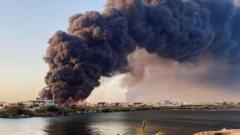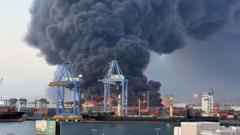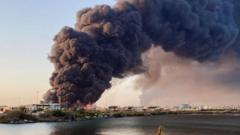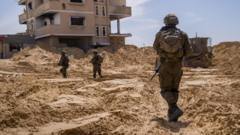**The RSF's drone strike on Port Sudan underscores the intensifying violence in Sudan, as civilians continue to suffer amid a worsening humanitarian crisis.**
**Paramilitary Forces Launch First Drone Attack on Port Sudan Amid Ongoing Civil Conflict**
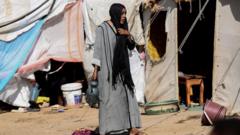
**Paramilitary Forces Launch First Drone Attack on Port Sudan Amid Ongoing Civil Conflict**
**Rapid Support Forces target military airport, marking a dangerous escalation in the two-year civil war**
The paramilitary group Rapid Support Forces (RSF) launched a drone attack on a military airport in Port Sudan on Sunday, marking a significant escalation as this city had previously been spared from such violence during the civil war. According to Sudanese army spokesperson Nabil Abdullah, the assault targeted the Osman Digna Air Base along with civilian facilities, deploying multiple "suicide drones" in the process. Although there were no immediate reports of injuries, Abdullah indicated that the attack resulted in limited damage.
Since armed conflict erupted in April 2023 between the RSF and the Sudanese Armed Forces (SAF), the humanitarian situation has deteriorated dramatically. The United Nations has cited this ongoing civil war as the world's largest humanitarian crisis, with an estimated death toll exceeding 150,000 and around 12 million people displaced from their homes. This violence, largely stemming from a power struggle over transitioning the country to civilian governance, has led to acute food shortages and famine affecting over 30 million people.
Port Sudan, previously considered a safe haven amid the chaos, became the operational headquarters for the military-backed government after the SAF lost control of Khartoum. Due to heightened conflict, many displaced civilians sought refuge in the city, leading to an influx of humanitarian agencies establishing their operations there. A traveler described an evacuation from the airport shortly after the strikes, highlighting the immediate threat facing civilians.
Prior to the recent RSF assault, Port Sudan had largely avoided military confrontation. However, the conflict's reach is expanding, as evidenced by a simultaneous RSF drone attack on Kassala, drawing attention to the widespread disruption affecting military and civilian infrastructure across Sudan.
The RSF, led by General Mohamed Hamdan Dagalo, has maintained control over significant territories, including parts of the Darfur region, whereas the SAF upholds control over strategic regions in eastern and northern Sudan. As fighting continues and international peace efforts stall, analysts suggest neither side will achieve total victory, perpetuating ongoing division and instability in the nation. The conflict represents Sudan's third civil war in 70 years and is viewed as one of the most severe, straining the nation’s social fabric and governance.
Since armed conflict erupted in April 2023 between the RSF and the Sudanese Armed Forces (SAF), the humanitarian situation has deteriorated dramatically. The United Nations has cited this ongoing civil war as the world's largest humanitarian crisis, with an estimated death toll exceeding 150,000 and around 12 million people displaced from their homes. This violence, largely stemming from a power struggle over transitioning the country to civilian governance, has led to acute food shortages and famine affecting over 30 million people.
Port Sudan, previously considered a safe haven amid the chaos, became the operational headquarters for the military-backed government after the SAF lost control of Khartoum. Due to heightened conflict, many displaced civilians sought refuge in the city, leading to an influx of humanitarian agencies establishing their operations there. A traveler described an evacuation from the airport shortly after the strikes, highlighting the immediate threat facing civilians.
Prior to the recent RSF assault, Port Sudan had largely avoided military confrontation. However, the conflict's reach is expanding, as evidenced by a simultaneous RSF drone attack on Kassala, drawing attention to the widespread disruption affecting military and civilian infrastructure across Sudan.
The RSF, led by General Mohamed Hamdan Dagalo, has maintained control over significant territories, including parts of the Darfur region, whereas the SAF upholds control over strategic regions in eastern and northern Sudan. As fighting continues and international peace efforts stall, analysts suggest neither side will achieve total victory, perpetuating ongoing division and instability in the nation. The conflict represents Sudan's third civil war in 70 years and is viewed as one of the most severe, straining the nation’s social fabric and governance.




